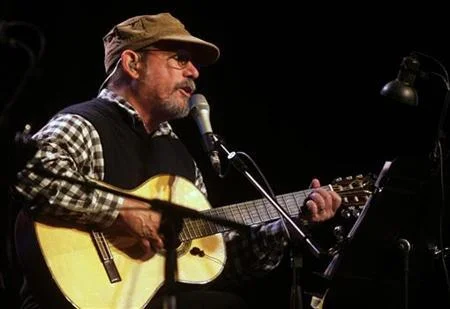Greatest Hits: Silvio Rodríguez Interview
The Cuban icon Silvio Rodríguez was about to perform his first show at New York’s Carnegie Hall when I interviewed him back in 2010. It was, I wrote, a watershed moment, and it seems even more significant now, at a time when the progress in U.S.-Cuba relations was reversed by Trump’s policies, before the pandemic totally put a stop to live concerts and the exchange between Cuban musicians and both U.S. audiences and U.S. musicians. To quote Silvio’s signature song, ojalá the music can begin to play again soon.
NEW YORK (Billboard) - For Cuban music fans and Cubaphiles, Silvio Rodriguez's sold-out June 4 concert at New York's Carnegie Hall will be a watershed moment. Often referred to as "the voice of the Cuban Revolution," Rodriguez has been granted a visa to enter the United States for the first time in 30 years. After his New York show, he will perform in Los Angeles and Oakland, Calif.; Washington, D.C.; and Orlando, Fla.
Billboard: Why is it important to you to sing in the United States, after all this time?
Silvio Rodriguez: Practically all of the music in the world has passed through the United States. I see myself as just another musician, among so many, who has gone there to play. On a political level between the two countries, I see my visit as a step forward. Let's hope that the relations between the two countries keep advancing in the direction of mutual respect.
Billboard: Do you think it's unjust that a Cuban artist cannot be paid for performing in the United States under the laws of the U.S. embargo?
Rodriguez: Of course I think it is unjust.
Billboard: How else has the embargo affected your career?
Rodriguez: Twenty years ago I instigated the creation of three recording studios. I supported their creation with money I earned in concerts outside of Cuba. At that time we could bring some equipment from England and other places in Europe. But when we wanted to buy equipment, it turned out that a lot of them were made by American companies, who refused to sell them to us because they were afraid of economic sanctions ... Everyone in my country has a thousand stories like these about the embargo.
Billboard: What type of projects take place in your recording studio, Estudios Ojala?
Rodriguez: Ojala was built in two upstairs rooms of a little house. I provided the technology and the instruments, and the state financed the renovation. I direct the studio, but the studio is the property of the government, like almost everything in Cuba. More than 60 percent of the recordings we do are donated to the artists. We have been able to help music school students who need to send demos to competitions -- and artists who have never had the chance to record.
Billboard: You have been called "the voice of the Cuban Revolution." Are you comfortable with that description?
Rodriguez: Not at all. The voice of the Cuban Revolution is Fidel (Castro), and its singing voice was Carlos Puebla. I agree with the principles that the revolution was founded on. I respect it and I could say it is an intimate part of me, because I became a man learning from the revolution. I've never tried to write political pamphlets; my love of poetry won't allow me to. I feel committed to the dignity of my people, who have gone through a lot without giving in.
